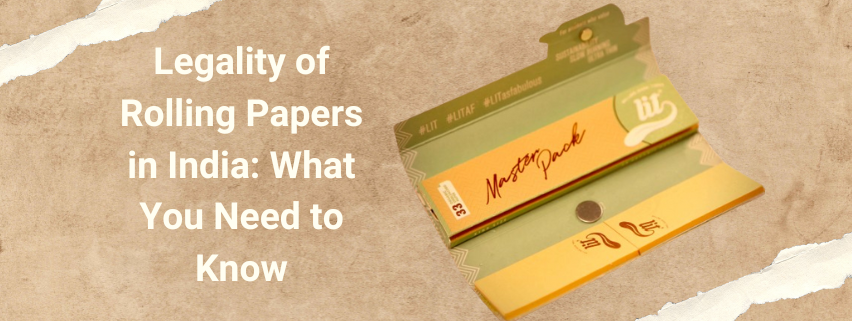Rolling papers are a common accessory for many who enjoy smoking tobacco or other herbs. However, questions about their legality often arise, especially in countries with varying laws regarding tobacco and other substances. In India, where regulations can be intricate and sometimes ambiguous, understanding the legality of rolling papers is essential for users and vendors alike.
Is it legal to own and sell rolling papers in India?
Investigating the historical background that influenced the regulatory framework is essential to grasping the whole legal position of rolling papers in India. The journey starts in the 1960s with the start of the US's massive "War on Drugs," a critical initiative to combat the growing problem of substance misuse. Interestingly, before the 'War on Drugs,' cannabis was viewed more liberally in India, where it was deeply ingrained in many religious and cultural customs.
The United States government stepped up its attempts to combat drug misuse as the 'War on Drugs' developed, which resulted in the categorization of marijuana, sometimes referred to as ganja, as a Class A substance. The idea for this categorization was the conviction that tough laws against marijuana will successfully reduce drug-related issues.
The United States exerted its global influence, especially in the area of drug control, even reaching India, with increasing diplomatic pressure starting in 1961. A coordinated worldwide campaign for tougher drug control laws was underway at this time, and India's answer was the 1986 passage of the Narcotic Drugs and Psychotropic Substances (NDPS) Act. With the passage of this legislation, India made great progress in harmonizing its drug control laws with global norms.
Substances like ganja (flower) and charas (resin), which are frequently connected to rolling papers, were deemed unlawful under the terms of the NDPS Act. This legislative change showed how international pressure to limit drug use has impacted India's legal system, deviating from the country's long-standing acceptance of cannabis.
Notably, under the NDPS Act, some substances like ganja were classified as Class A narcotics; however, rolling papers, bongs, and other equipment associated with the industry were excluded from this categorization. Because there was no clear law barring this smoking equipment, rolling papers were still allowed to buy, sell, and possess in India. The primary focus of legal prohibitions, as outlined in the NDPS Act, was on banned substances and their derivatives. This highlights the regulatory distinction between substances associated with drugs and the instruments used to consume them.
Understanding this complex historical story makes it easier to understand how drug control laws have changed in India, highlighting the complex interactions between foreign influences, national regulations, and the legal standing of accessories like rolling papers. Based on the current legal framework, it can be concluded that rolling papers and other smoking accessories are completely lawful in India to possess and sell.
Regulations and Enforcement:
Enforcement of laws related to rolling papers can vary across different states and regions in India. While some areas may have strict enforcement regarding the use of rolling papers for cannabis or other illicit substances, others may prioritize other aspects of law enforcement.
It's crucial for users to be aware of the laws specific to their location and exercise caution when using rolling papers for anything other than tobacco. Additionally, vendors should adhere to regulations and avoid promoting or facilitating the use of rolling papers for illegal purposes.
Rolling papers themselves are legal in India, but their usage may be subject to regulations, particularly when it involves substances like cannabis. Understanding and complying with relevant laws and regulations is essential for both users and vendors to avoid legal complications. As with any legal matter, staying informed and exercising caution can help ensure a safe and legal experience for all involved.










